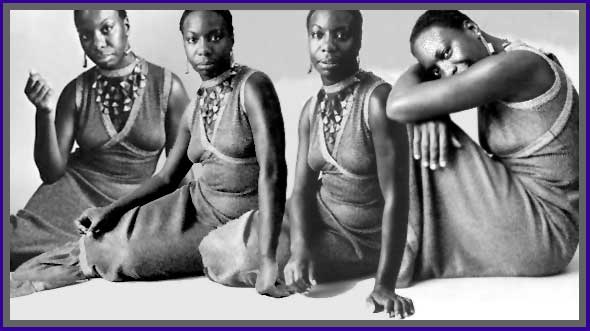TALIB KWELI & HI-TEK / “For Women”
Anybody can tell you how it is. What we putting down right here is how it is and how it could be. —Talib Kweli, from the introduction to “Africa Dream”
 While I can’t say Talib Kweli’s version of “Four Women” (which he titled slightly differently, in deference to its usually being performed in the first person) is my favorite version of the song, it is the most interesting version I know.
Hip-hop is a now-obsessed culture, both for better and for worse. There are very few, if any, successful rap records that have the historical breadth and sweep of a song like “Four Women.” But instead of being limited by the ‘now-ism’ of hip-hop, Kweli embraces the truism, rewriting Nina Simone’s metaphoric archetypes as far more literal characters.
Compare the description of Aunt Sarah in the original with Kweli’s description of the same character:
While I can’t say Talib Kweli’s version of “Four Women” (which he titled slightly differently, in deference to its usually being performed in the first person) is my favorite version of the song, it is the most interesting version I know.
Hip-hop is a now-obsessed culture, both for better and for worse. There are very few, if any, successful rap records that have the historical breadth and sweep of a song like “Four Women.” But instead of being limited by the ‘now-ism’ of hip-hop, Kweli embraces the truism, rewriting Nina Simone’s metaphoric archetypes as far more literal characters.
Compare the description of Aunt Sarah in the original with Kweli’s description of the same character:
Nina: My skin is black, my arms are long My hair is wooly and my back is strong Strong enough to take all the pain That’s been inflicted again and again What do they call me? My name is Aunt Sarah
Kweli: Her skin was black like it’s packed with melanin Back in the days of slaves she’d be packin' like Harriet Tubman And, her arms are long and she moves like song Feet with corns, hands with calluses, but the heart is warm And, her hair is wooly and it attract a lot of energy Even negative / She gotta dead that, the head-wrap is a remedy Her back is strong and she’s far from a vagabond This is the back the master’s whip used to crack upon Strong enough to take all the pain, that's been inflicted Again and again and again and again and flip it To the love of her children / Nothing else matters What do they call her? / They call her Aunt Sarah.The first thing one notices (aside from the oft-cited verbosity of rap lyrics) is how much more visual and how much less ‘poetic’ the overall effect is. When Kweli describes Aunt Sarah, we see a specific elderly black woman. When Nina describes Aunt Sarah, we are presented with a composite image of elderly black women of a particular time period. The other noticeable difference is the way Kweli recasts the derogatory usage of ‘Auntie.’ In “Four Women,” Aunt Sarah represents elderly black women who have managed to survive, yet are still troubled and hobbled by their painful pasts. In “For Women,” Aunt Sarah is a particular elderly black woman who has transformed her painful past via her role as caretaker of her neighborhood’s young people. In a way, Kweli’s “For Women” is a tribute not only to Nina Simone specifically and to ‘our elders’ in general (Kweli mentions both in the intro) but also to the first character, Aunt Sarah. As Kweli recites the tragic tales of The Creole, ‘Saphronia’; The Prostitute, ‘Sweet Thing’; and The Slavewoman, ‘Peaches,’ my thoughts remain partially with Aunt Sarah—she of the 107 years, dreadlocks, good vibes and optimism. “You figure she’d be bitter in her twilight,” Kweli raps, “But she’s alright, ‘cause she done seen the circle of life.” Like Aunt Sarah herself, Kweli uses the power of optimism to transform “Four Women,” a tale of tragedy and pain, into “For Women,” a tribute to perseverance, struggle and, eventually, triumph. —Mtume ya Salaam Four more women I dig Talib’s lyrics. A lot. Overall, it’s an inventive re-telling of Nina’s timeless (although historically grounded) tale. However, what was unfulfilling for me was the music, or the lack of music. I know, I know, the beat is the music—but even beats can be hipper than loops if you understand beat as trance, yet, even if you don’t, strictly taken as “the beats is the music,” the music of this was thin, certainly thinner, much, much thinner than what Talib did with the lyrics, which all leads me to Joy Denalane’s take on Nina’s classic song.
 What Ms. Denalane does is start with an interesting supposition, suppose we get four different women to sing, each woman taking a different verse, and suppose we recast it in a soul/R&B vein, what would we get. And, oh yeah, what about having each women sing in a different language (Portuguese, Shona, French and German). So now what happens is that “Four Women” is opened up to the international experiences of women of African descent.
The women are Sara Tavares (born in Portugal of Cape Verdean parents); Chinowiso, from Zimbabwe; Deborah (whose parentage I don’t know); and afro-German Joy Denalane. This version is immediately recognizable as Nina’s song, but totally unrecognizable in terms of what they are saying because we are getting a mélange of tongues detailing a tableau that is both well-known and at the same time highly personal, plus they change some of the lyrics and do not present them in the order of the original song. Joy calls her version "Vier Frauen: Quatro Mudjer/Vakadzi Vana/Quatre Femme." This is a very, very interesting version.
Joy is not the only person to think of this approach. The Daughters of Soul with Simone (Nina’s daughter Lisa), Joyce Kennedy, Sandra St. Victor and Nona Hendryx also use this approach, but except for Nona, The Daughters rather than reciting a personal tale seem to me to be grandstanding, seem to be aware that they are performing for an audience, but Joy’s version, even though I don’t understand everything they are saying, has a feeling that what each of them is saying is something they not only believe, but to a certain extent have experience or are currently living.
What Ms. Denalane does is start with an interesting supposition, suppose we get four different women to sing, each woman taking a different verse, and suppose we recast it in a soul/R&B vein, what would we get. And, oh yeah, what about having each women sing in a different language (Portuguese, Shona, French and German). So now what happens is that “Four Women” is opened up to the international experiences of women of African descent.
The women are Sara Tavares (born in Portugal of Cape Verdean parents); Chinowiso, from Zimbabwe; Deborah (whose parentage I don’t know); and afro-German Joy Denalane. This version is immediately recognizable as Nina’s song, but totally unrecognizable in terms of what they are saying because we are getting a mélange of tongues detailing a tableau that is both well-known and at the same time highly personal, plus they change some of the lyrics and do not present them in the order of the original song. Joy calls her version "Vier Frauen: Quatro Mudjer/Vakadzi Vana/Quatre Femme." This is a very, very interesting version.
Joy is not the only person to think of this approach. The Daughters of Soul with Simone (Nina’s daughter Lisa), Joyce Kennedy, Sandra St. Victor and Nona Hendryx also use this approach, but except for Nona, The Daughters rather than reciting a personal tale seem to me to be grandstanding, seem to be aware that they are performing for an audience, but Joy’s version, even though I don’t understand everything they are saying, has a feeling that what each of them is saying is something they not only believe, but to a certain extent have experience or are currently living.
 As for Nina, she has so many versions to choose from. The one included here is newly released on a “dual disc” (DVD on one side, CD on the other) and is taken from a 1969 Harlem, NY festival. Two things lept out at me in watching Nina sing “Four Women.” One was her absolute mastery of the piano. Even though you don’t get many shots of her hands, you can hear what she is doing, how she is leading the music, and it is entrancing. Two is that she didn’t use histrionics or busy gestures, most of the time her face is mask-like in its stillness, but this is not a placid stillness, rather this is the trance state, and it is so wonderful how Nina can reach deep inside you while hardly even moving. No showing off. No making faces. Not even exaggerated concentration, you know, like when people are pretending they are doing something deep. This is the real deal, which is, after all, what one expects and, invariably, what one gets from Nina Simone. The real deal.
—Kalamu ya Salaam
As for Nina, she has so many versions to choose from. The one included here is newly released on a “dual disc” (DVD on one side, CD on the other) and is taken from a 1969 Harlem, NY festival. Two things lept out at me in watching Nina sing “Four Women.” One was her absolute mastery of the piano. Even though you don’t get many shots of her hands, you can hear what she is doing, how she is leading the music, and it is entrancing. Two is that she didn’t use histrionics or busy gestures, most of the time her face is mask-like in its stillness, but this is not a placid stillness, rather this is the trance state, and it is so wonderful how Nina can reach deep inside you while hardly even moving. No showing off. No making faces. Not even exaggerated concentration, you know, like when people are pretending they are doing something deep. This is the real deal, which is, after all, what one expects and, invariably, what one gets from Nina Simone. The real deal.
—Kalamu ya Salaam
This entry was posted on Saturday, October 29th, 2005 at 11:23 pm and is filed under Cover. You can follow any responses to this entry through the RSS 2.0 feed. You can leave a response, or trackback from your own site.
9 Responses to “TALIB KWELI & HI-TEK / “For Women””
October 30th, 2005 at 6:13 pm
Although the original stands out in my opinion, Veir Frauen is a nice interpretation. The Talib rendition just doesn’t appeal to me.
October 31st, 2005 at 5:50 am
One of my favourite tracks from my favourite albums. its a pity Kweli cant make songs like this anymore, but thats another discussion…
October 31st, 2005 at 12:38 pm
Kweli’s joint stands far and away above the majority of hip-hop in that not only praises his elders (Nina Simone whom I often wonder isn’t Kweli’s favorite artist as he references her in many of his songs and/or uses samples of her work in much of his beats) but also in its depth of creativity. I have yet to find a hip hop artist (and I have listened to many over the past 25 years that hip hop truly became formidable) delve deep into the history of black people in this country quite like Talib does in his “cover” of Nina’s Four Women. It’s very hard to do when covering a classic song by a classic musician but I honestly think his version possibly surpassed the master herself! I get chills when that piano and viloin kick meet the drumbeat at the 0:44 second mark. Chilling lyrics, chilling stories, chilling track overall! As the final track on Kweli/Hi-Tek’s first album, this often is forgotten about and it needn’t be………..Kudos for bringing this song to more people’s attention!
October 31st, 2005 at 6:35 pm
Talib managed to enter that rare plateau of artistry: No matter what pigeon shit you drop on our listening heads later in life, you did THAT!
Rass Kass made “Nature of the threat” and we been takin’ our sunday’s best to the cleaners ever since.
Talib’s THAT is “for women”.
What makes this hidden track from the “train of thought” classic is it’s intent on recreating Nina’s class “four women” as a true fan.
You can tell dude really loves this song. And truthfully as an artist, Talib didn’t have to cover this song for any forseeable “hip hop” reason.
I love when cats think outside the coffin, especially mc’s.
i saw talib end his set at the house of blues with “for woman”, and he was obviously floored when people were rockin’ to that shit, singing along.
it was special…
November 3rd, 2005 at 6:52 pm
have to say, my favorite cover (so far) of Four Women is nenna freelon’s. it’s so alive and vibrant and proud and unapologetic about who “the women” are.
somehow, talib’s version of this song got by me all these years; i was surprised to learn of it here. i’ll definitely check it out, as i do have two other talib cd’s in my collection. so i’m quite curious.
November 4th, 2005 at 5:34 pm
I agree with you Nadir, Talib is in that rarefied group of artists. For me, his THAT was 2000 seasons..
January 18th, 2007 at 10:09 pm
Kweli’s version is phenomenal, and in my opinion the beat is up to par. I could understand how some people might not appreciate it as much, but it really gives it both emotion and hip hop flavor to me, the brief snips of horns and the low-filtered bass are trademarks in many older classic hip hop songs. Props to the author of this article, I just discovered this song not too long ago and now I’d say it is in my favorites of all time category. In this song, Kweli lives up to not just showing it how it is, but how it could be. He shows the high potential of hip hop to create something that is intellectually stimultating and emotionally potent.
February 24th, 2014 at 5:19 am
Talib’s version is ambitious and he pulls it off extremely well. Few rappers can focus long enough to weave a tale this enthralling. He knows where he is heading to and gets there. Definitely one of my favorite songs ever.
Leave a Reply
| top |